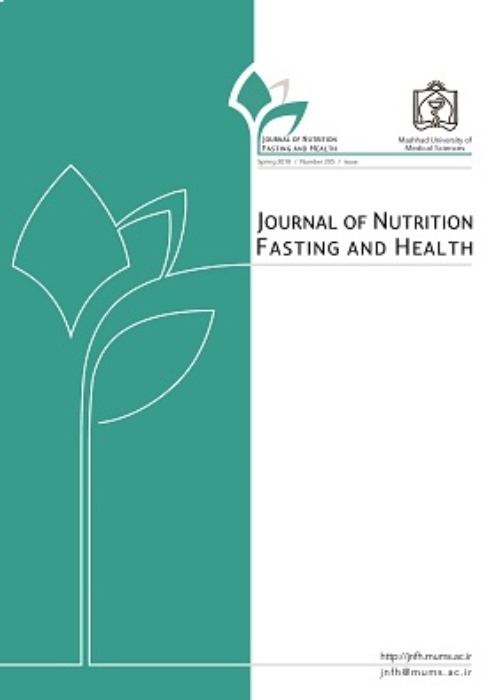Effects of Oregano Methanolic Extract on the Chemical, Microbial, and Sensory Properties of Yogurt
Author(s):
Article Type:
Research/Original Article (دارای رتبه معتبر)
Abstract:
Introduction
The demand for antimicrobial compound alternatives to replace synthetic additives is on the rise. In food commodities, use of synthetic antimicrobials based on herbal extracts is attracted attention. The present study aimed to assess the chemical, microbiological, and sensory properties of the yogurt samples treated with oregano extract (0%, 0.75%, 1%, and 1.5%) during storage for 30 days at refrigerated temperature. Methods
The in-vitro antibacterial effect of oregano extract was evaluated using agar disk-diffusion assay. Natural yogurt was prepared using a combination mixture of whole milk and 4% skimmed milk powder. Various concentrations of the oregano extract (0%, 0.75%, 1%, and 1.5%) were added to the samples. During 30 days of refrigerated storage, various parameters were evaluated, including titratable acidity, pH, mold and yeast counts, total coliforms, and sensory attributes (overall liking, appearance, and aroma). Results
The descending order of the in-vitro antibacterial effect of the oregano extract was as follows: Listeria monocytogenes>Staphylococcus aureus>Bacillus subtilis>Bacillus cereus>Salmonella typhimurium>Escherichia coli O157:H7. Differences were observed in the counts of mold and yeast in the samples over time. Accordingly, bioactive yogurt had lower mold and yeast counts (1-1.5 log CFU/g) after 30 days of storage compared to the control (P<0.05). In addition, significant differences were observed in the hedonic scores of aroma and appearance between the samples containing the oregano extract compared to the control group (P<0.05). Conclusion
According to the results, oregano extract could be used as a natural compound to improve the shelf life of yogurt at refrigerated temperatures for 30 days. Furthermore, oregano extract is considered to be an effective inhibitory compound against L. monocytogenes, S. aureus, B. subtilis, B. cereus, S. typhimurium, and E. coli O157:H7.Keywords:
Language:
English
Published:
Journal of Nutrition, Fasting and Health, Volume:7 Issue: 3, Summer 2019
Pages:
138 to 145
magiran.com/p2003710
دانلود و مطالعه متن این مقاله با یکی از روشهای زیر امکان پذیر است:
اشتراک شخصی
با عضویت و پرداخت آنلاین حق اشتراک یکساله به مبلغ 1,390,000ريال میتوانید 70 عنوان مطلب دانلود کنید!
اشتراک سازمانی
به کتابخانه دانشگاه یا محل کار خود پیشنهاد کنید تا اشتراک سازمانی این پایگاه را برای دسترسی نامحدود همه کاربران به متن مطالب تهیه نمایند!
توجه!
- حق عضویت دریافتی صرف حمایت از نشریات عضو و نگهداری، تکمیل و توسعه مگیران میشود.
- پرداخت حق اشتراک و دانلود مقالات اجازه بازنشر آن در سایر رسانههای چاپی و دیجیتال را به کاربر نمیدهد.
In order to view content subscription is required
Personal subscription
Subscribe magiran.com for 70 € euros via PayPal and download 70 articles during a year.
Organization subscription
Please contact us to subscribe your university or library for unlimited access!


